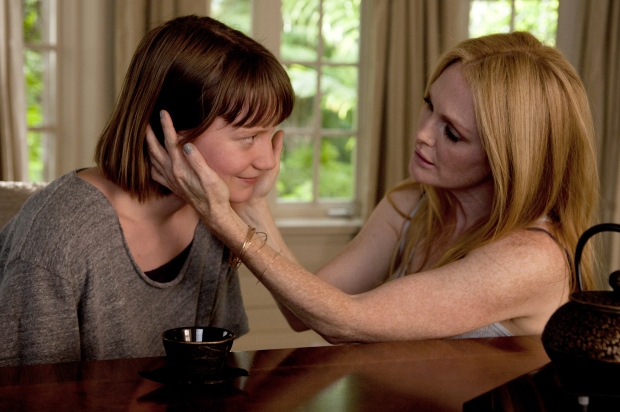Maps to the Stars provides some stellar performances, but loses narrative focus.
Director: David Cronenberg
Cast: Julianne Moore, Mia Wasikowska, Evan Bird, John Cusack, Olivia Williams, Robert Pattinson, Sarah Gadon
Rating: 18
Running Time: 1 hour, 51 minutes
UK Release Date: 26th September 2014
MAPS TO THE STARS director David Cronenberg, made his name with the exploration of skin-crawling body horror in films such as Videodrome and The Fly. In recent years, his focus has turned towards the inner ugliness of humanity, explored triumphantly in A History of Violence and Eastern Promises, and somewhat unevenly in A Dangerous Method and Cosmopolis. His Hollywood satire, Maps to the Stars, looks set to further stoke the critical fires.
The film follows a series of people living in the twisted tapestry that is Hollywood. The cast includes almost-past-her-prime actress Havana Segrand (Julianne Moore), working to secure the lead role in a remake of a classic film starring her deceased mother, actress Clarice Taggart (Sarah Gadon), who visits her in ghostly hallucinations. Her personal assistant is recently released pyromaniac Agatha (Mia Wasikowska) who has a few screws loose to put it mildly.
Agatha is longing to make amends with her dysfunctional family; physical therapist/control freak Stafford Weiss (John Cusack), his damaged wife Christine (Olivia Williams), and their son, child star/recovering drug addict Benjie Weiss (newcomer Evan Bird). So, everyone in this film is connected. More or less by Hollywood, but as the film unravels, you feel that everyone is more closely linked by an unbalanced combination of narcissism and neuroses.
As is common for satires, the script takes a stab at Hollywood’s workings every chance it gets, from demonised child actors, Oscar bait films, to the works of ‘serious directors’ in the art-house market and the extremes actors are prepared to go to land roles. Yet, as the film progresses, and everyone’s problems are laid out, Maps to the Stars begins to feel less like a satire and more like a Greek tragedy that would make Freud proud. This is where the film loses its narrative focus, as if it is undecided what message it is looking to get across, including a series of plot twists that may have nothing or everything to do with Hollywood depending on your viewpoint.
What’s worse is that the muddled plot risks damaging a series of stellar performances. Moore earns her Cannes Best Actress prize as a bitter woman seeking to step out of her mother’s shadows, yet is continuously drawn back into it. The role calls for some heavy emotional swerves, yet Moore transitions beautifully between a prima donna and an emotional volcano. Wasikowska, likewise, brings out the cute-and-bubbly side of insanity, keeping us constantly guessing as to what Agatha’s intentions are. It’s almost surprising with how sweet and lovable she comes across, insanity aside.
Evan Bird appears to be channelling Joffrey Baratheon in his portrayal of Benjie, emitting an air of bloated entitlement and indifference. But this isn’t a simple hate-to-hate scenario. It may be difficult to watch some of Benjie’s dubious antics, but the fact that he remains one of the most perplexing and watchable characters is a testament to Bird’s evident up-and-coming talent. If this young man is set for a long career in Hollywood, what better way to kickstart it with a role exploring the potential pitfalls?
Unfortunately, despite servicable acting, the Weiss parents, dubious therapist Stafford and neurotic Christina, are both severely underdeveloped, and could have done with more screentime, despite the risk of further stomach turning. The same can be said for Robert Pattinson‘s Jerome, who feels the most out of place (and yet ironically, is probably the only character you could consider remotely sane). His presence is so wasted, one wonders whether Maps to the Stars would have suffered much had he been cut altogether. Even in the one scene you could consider him a crucial presence, he’s more significant for the chain of events set off rather than as a character. There’s a harsh irony to this considering screenwriter Bruce Wagner based Pattinson’s character on his own experiences.
Had the film remained similar to its first act, the narrative may have fared better, but Maps to the Stars struggles through its conflict between exploring its cast’s psyches, or satirizing Hollywood, resulting in a muddled affair. Yet despite losing its focus halfway through, Maps to the Stars remains watchable if only for Cronenberg’s slow-burning directing style and its demented cast.
Verdict
![]()
Written by Peter Colley






























